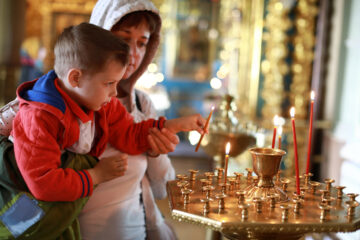Metropolitan Nikolaos (Hatzinikolaou) of Mesogaia and Lavreotiki
An experience which isn’t genuine produces Christians who, instead of being saved within the Church, feel as though they should save the truth. Instead of discerning the face of Christ in our brother and sister Christians, we see opponents whom we must overcome, or we see ‘our own people’, who have to support our views. Instead of entrusting the state of our soul to the power of the grace of God, we place it, with unforgivable negligence, at the disposal of the dubious scalpel of psycho-therapeutic methods, or scientific assessments or rationalistic forecasts. Instead of nourishing our soul with humility of the heart, we feed it with the answers of knowledge and reason.
In the modern bio-ethical challenges which touch our lives and invade our daily routine, we don’t discern a love which liberates, nor an essential outlook which takes us into spheres of a different kind of logic. Instead we slavishly insist on legal pedantries which suffocate grace; or we have recourse to secular compromises which drive grace away entirely. Rather than functioning as unobtrusive cells in Christ’s spiritual body, we see the Church as a club, with members, a rule-book, rights and obligations; an organization that has greater need of our own help than that of others.
This is why, instead of living in the Church as in a permanent tomb which gives birth to our resurrection, with deep humility, a disposition towards sacrifice, a willingness to make concessions, honor and recognition for others, forbearance, and faith in God’s grace alone, we behave as if we’re just passing through, with an earthly perspective, demands and rights, uncontrolled sensitivities, crypto-egotism, pseudo-hypocrisy, petty self-interest, foolish comparisons and casual altercations, insecurities, a sense of superiority, incomprehensible compromises, psychological misery and unjustifiable secularity.
The lies we tell ourselves, the unconvincing justifications, the difficulty in accepting any kind of criticism and the concomitant ease and willingness to judge everyone and everything entirely superficially and usually with harsh and heartless criteria, betray a guilty short-sightedness which triumphantly demonstrates our inadmissible lack of freedom.
This kind of attitude makes us invent a God who is per se questionable. A God who continually invalidates himself; a God who more closely resembles a psychological construct characterized by morbidity and deficiency; or an ideological refuge distinguished by impermanence and spiritual opportunism; a God who isn’t a father who loves us, but a servant to solve our paltry problems; a God who isn’t there to support us, but one whom we invented in order to lend him our support; a God who doesn’t even exist nor, of course, is worthy of anyone’s faith.
Such an outlook leads us to a church which is our own creation, not that of God. It has the faults of the twelve gods of Olympus and the trustworthiness of social organizations or transcendental meditation. It’s a mechanism that’s accommodating for a while, is part of a social grouping, conceals the majesty of the human race and snuffs out the possibility of achieving the likeness of God. Such a church doesn’t and can’t deserve your trust. All you have to do is to acknowledge it mechanically.
Source: pemptousia.com




0 Comments